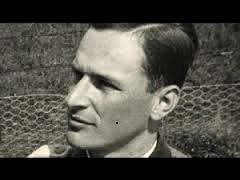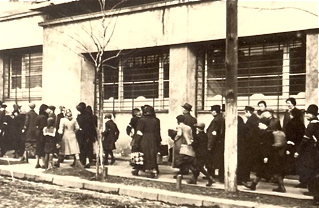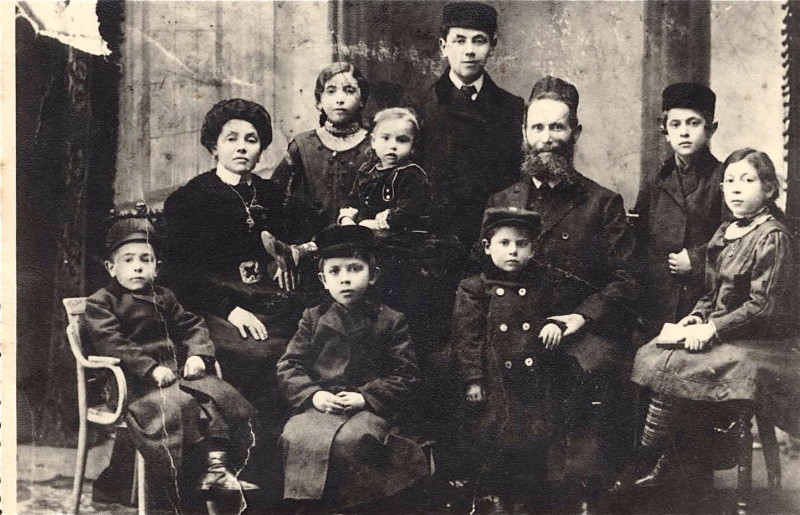Udo Klausa regarded himself as a “decent” Nazi.
From 1940 to 1942, he was the principal civilian administrator of Bedzin, a mid-sized town in Poland that, in September 1939, was the scene of one of the very first Nazi atrocities against Jews.
Klausa was not at his post in Bedzin when these crimes were committed, but once there, he implemented antisemitic measures that marginalized and impoverished the town’s Jewish inhabitants.

“He was in some senses paradigmatic of many who considered themselves to be ‘decent Germans’ and who sustained the Nazi regime, while distinguishing themselves from those they saw as the ‘real’ or ‘fanatic’ Nazis, and then realized only too late just what depths of criminality this regime actually entailed,” writes Mary Fulbrook in A Small Town Near Auschwitz: Ordinary Nazis and the Holocaust, published by Oxford University Press.
Fulbrook, a professor of German history at University College London, has written an instructive and important book about a middle-level Nazi functionary who facilitated the genocidal schemes of a criminal regime. There were thousands of faceless Germans like Klausa, and without them the Holocaust could not have been carried to fruition.
As Fulbrook observes, “Klausa’s career and the fate of the Jews in Bedzin came together for just a short period. Klausa was not an independent initiator of Nazi policies, but he faithfully implemented directives passed on to him by his superiors in the administrative and political hierarchy. Similarly, although not personally fired by what has controversially been called ‘exterminationist antisemitism,’ Klausa had underlying assumptions about the essential reality of ‘racial’ distinctions, and these, together with his unexamined belief in the intrinsic superiority of Germans over Poles and Jews, partially explain his failure of empathy and willingness to subordinate and discriminate against those he considered ‘racially’ inferior.”
Klausa arrived in Bedzin, in Upper Silesia, less than a year after it was occupied by the German army. Within days, the Great Synagogue was set on fire. Several hundred Jews who had been locked inside and in surrounding houses were burned alive or shot as they frantically jumped out of windows, in a precursor to the Holocaust.

Over the next two years, the remaining Jews were driven out of their homes, forced to live in uninhabitable places, robbed of their livelihoods, exploited as slave laborers and sent away to work camps.
In 1942 and 1943, the Jews of Bedzin were transported to Auschwitz, 40 kilometres away, in three major deportations and innumerable smaller roundups. They were among the first Polish Jews to succumb to the deadly effects of Zyklon B gas.
Bedzin, a significant center of Jewish life in western Poland on the eve of World War II, was incorporated into the Greater German Reich after its conquest by Germany. Nearly half of its population of 54,000 was Jewish.
In Fulbrook’s estimation, Polish antisemitism was a fact of life in Bedzin before the Germans marched in. It was worse in areas where Jews were in a minority and less virulent where they formed a critical mass, she says. Fulbrook adds that some Poles, risking their lives and that of their families, helped Jews after the arrival of the Germans.

Klausa, a Catholic, was born in 1910. A lawyer by profession, he joined the Nazi party only three weeks after Adolf Hitler was appointed chancellor in January 1933. Fulbrook speculates that his party membership was rooted in opportunism. But his racist beliefs were also a factor in his decision to align himself with the National Socialists. In 1936, he wrote a racist tract, Race and Military Law.
Before being posted to Bedzin, he served in Nazi-occupied Czechoslovakia. As Fulbrook says, Klausa’s task in Bedzin was to implement policies that rendered Jews outcasts. Being efficient, he carried out these measures with dispatch. But as she points out, the Nazi program of mass extermination went “way beyond the policy of colonial racism that he had supported up to this point.”
His wife, Alexandra, shared his antisemitic outlook. In a letter to her mother in August 1940, she described Bedzin’s Jews as “grimy, ragged and disgusting.”
“Alexandra’s reaction was not atypical for people of her generation coming for the first time to the eastern provinces and being exposed for the first time to the realities of Jewish life under Nazi rule,” writes Fulbrook, whose mother, a socialist and a “committed Christian” of Jewish descent, was Alexandra’s closest school friend.
“Very few Germans made the connection between Nazi policies and the all too visible evidence of Jewish and Polish degradation. Many simply saw this as confirmation of the racial stereotypes they had been served in Nazi ideology.”
Despite his views, Klausa apparently tried to save the life of Laib Flojm, a Jew who had worked in his office in Bedzin. Klausa appears to have felt some “warmth” toward Flojm and his family, but as Fulbrook notes, “this sort of sympathy for an ‘individual Jew’ was quite widespread, even among those who agreed in general Germany should be rendered ‘Jew free.'”
In his postwar memoirs, Klausa attempted to distance himself from Nazi crimes. He refused to accept responsibility for Germany’s policies toward Jews and claimed he was frequently absent from Bedzin.
Fulbrook does not buy his self-serving story.
“For without the actions of many perfectly decent and ordinary civilian administrators like Klausa, the Jews of Upper Silesia would never have been brought to a position in which it would be, relatively, so easy for the ‘final perpetrators’ and ‘actual executioners’ to carry out the last and lethal stages in the mass extermination of the Jews.”
Accusing him of never having faced up to the truth, she says he distorted his record in Bedzin so that he could portray himself in a purely positive light. As she puts it, “He ratified and implemented racist policies in his administrative role with absolutely no regard for the long-term consequences for the victims, and even an apparent unawareness of their suffering as a direct effect of the policies he upheld.”
Clearly, he was uncomfortable about his past. But it had no bearing on him after the war. “Klausa managed to make the transition to a successful post-war career in the Federal Republic of Germany, rapidly advancing and conforming to the demands of the new democracy,” she says.
His Nazi party membership and his role in the persecution of Jews in Bedzin did not affect him in the least after the war.

